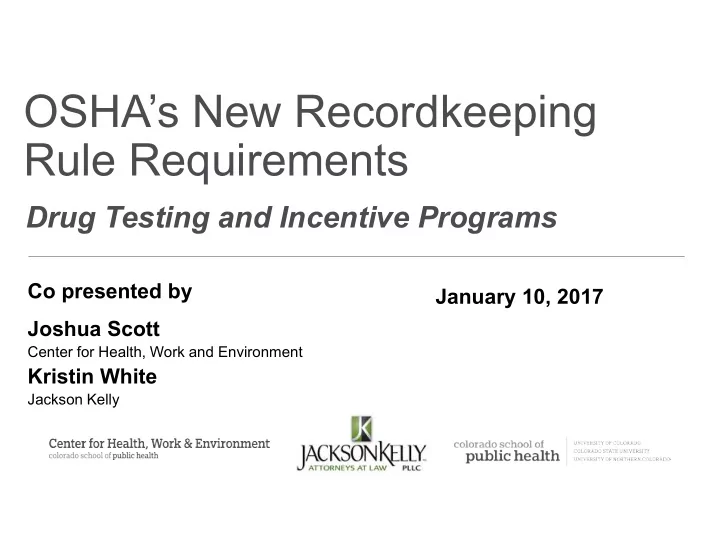

OSHA’s New Recordkeeping Rule Requirements Drug Testing and Incentive Programs Co presented by January 10, 2017 Joshua Scott Center for Health, Work and Environment Kristin White Jackson Kelly
Confidentiality Note: This presentation from the law office of Jackson Kelly PLLC and the Center for Health, Work, and Environment @ the Colorado School of Public Health is for the sole use of the intended viewers and contains confidential and privileged information. Any unauthorized review, use, disclosure, distribution, or other dissemination of this presentation and/or the information contained herein is strictly prohibited.
New Regulation • On May 12, 2016, OSHA amended the Recordkeeping Regulation: • Some employers required to electronically submit injury and illness records to OSHA annually • Explicit anti-retaliation provisions
Anti-retaliation provisions Disciplinary, Drug Testing and Incentive Programs
Current Anti-Retaliation Protection • Recordkeeping Rule • Record injury or illness in 7 days • Employee must be able to report an injury or illness promptly • Section 11(c) of the OSH Act • Prohibits retaliation for injury reporting • Employee has 30 days to file complaint • No individual cause of action
New Anti-Retaliation Provisions • Under new provisions, employer must: • Inform employees of their right to report injuries and illnesses free from retaliation • Provide “reasonable” reporting procedures that do not deter or discourage employees from reporting • Refrain from taking “adverse action” against employee for reporting
Reasonable Reporting System Test: Whether the reporting procedures would deter a “reasonable employee” from reporting a work-related injury or illness
Reasonable Reporting System • Reporting procedure should not require multiple steps • “Rigid” reporting requirement • Reporting rules cannot penalize workers who did not immediately realize the seriousness of injury - Fairfax Memo (3/12/12) • Reporting procedures must allow reporting of injury/illness within “reasonable” timeframe after employee realizes they have suffered a work- related injury
Reasonable Reporting System • US Steel Case Example • Requiring reporting of all incidents, not just serious injuries
Adverse Action: Disciplinary Policies • Disciplining employee who reports injury/illness regardless of whether employee violated safety rule • Disqualifying employee who reports injury/illness from promotion or bonus • Pre-textural discipline based on violation of safety rules • Safety rule only enforced when employee injured • Rule is vague – “maintain situational awareness”
Adverse Action: Drug Testing • Structure Testing Program in a way that does not limit reporting • Employers must limit drug testing to incidents in which there is a reasonable possibility that drug use was a contributing factor to the incident • Impairment Considerations currently limited to Alcohol • Employers may continue to conduct drug testing required to comply with workers’ compensation and other state or federal laws
Adverse Action: Drug Testing • Blanket post-injury drug testing could violate the rule –it’s the incident not the injury that matters • Examples: • Bee Sting • Repetitive Strain Injury • Tool Malfunction
Drug Testing in Practice • Testing for all injuries as opposed to those requiring medical treatment • Industry reactions to rule
Adverse Action: Incentive Programs • Does not ban incentive programs • Programs must be structured in a way that it encourages safety without discouraging reporting • i.e., rule based
Incentive Programs • Examples of programs that could violate rule: • Entering employees who did not report injuries in drawing • Awarding bonus to team if no one reported injuries • Rate-based incentive programs that reward workers or supervisors for achieving low rates of reported injury and illness
Incentive Programs • OSHA encourages incentive programs that promote worker participation in safety-related activities, such as identifying hazards or participating in investigations or injuries, incidents, or ‘near misses’.
Enforcement • The rule “allows OSHA to issue citations to employers for retaliating against employees for reporting work-related injuries and illnesses and require abatement even if no employee has filed a Section 11(c) complaint” • An “abatement order can be a more efficient tool to correct employer policies and practices than injunctions” under § 11(c)
Enforcement • BUT…to issue a citation OSHA must have reasonable cause to believe a violation occurred • AND… Prove it • Circumstantial evidence is ok
Enforcement: Issuing a Citation In order to issue a citation, OSHA must prove - 1. An employee reported a work-related injury or illness; 2. An employer took adverse action against the employee; and 3. An employer took the adverse action because the employee reported a work-related injury or illness, not for legitimate business reason,
What is the Remedy? • To “abate” a violation of the anti-retaliation provisions in the Recordkeeping regulation, employer could be required to: • Remove discipline from file • Reinstate employee • Pay back pay
Implications • OSHA is not be required to rely on employee to file whistleblower complaint • Additional time to pursue employers for alleged retaliation • 6 months v. 30 days
Effective Date • Anti-retaliation provisions were effective on December 1, 2016 • These provisions apply to all employers required to maintain injury and illness records regardless of establishment size
Questions?
For more information on these and other occupational safety and health topics, please visit: http://safety-health.jacksonkelly.com/ & chwe.ucdenver.edu Joshua Scott Kristin R.B. White, Esquire 13001 E. 17 th Place 1099 18 th Street, Suite 2150, Denver, CO 80202 3 rd Floor, Building 500, W3111 Phone: (303) 390-0006 • Fax: (303) 390-0177 303.724.9571 (o) | joshua.scott@ucdenver.edu (e) kwhite@jacksonkelly.com • www.jacksonkelly.com www.chwe.ucdenver.edu
Recommend
More recommend